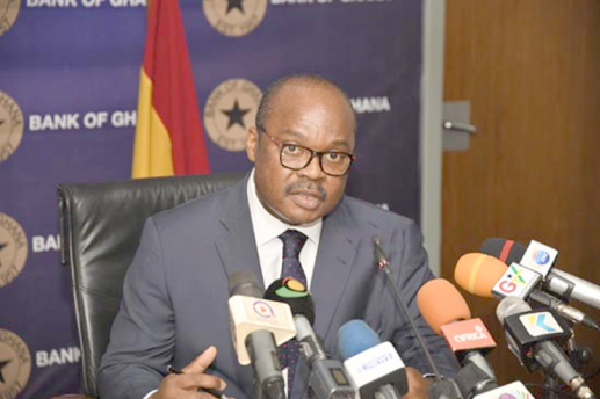
Bank of Ghana raises policy rate to 29.5%
The Bank of Ghana (BoG) has raised its policy rate to 29.5 per cent from 28 per cent in a bid to curb inflationary pressures.
It has also directed banks and other deposit-taking institutions to keep more cedi deposits in their vaults to help reduce the amount of money in circulation.
The measures, which were announced yesterday, form part of a wide strategy by the central bank to further reduce excess liquidity in the system, dampen price pressures and keep inflation on the downward trend.
The Governor of the central bank, Dr Ernest Addison, said at the press conference to announce the rate that the measures were needed to “place the economy firmly on the path of stability and reinforce the pace of disinflation.
Policy tightening
Yesterday’s hike in the rate by 150 basis points now brings the cumulative increase to 1,600 basis points since the central bank’s monetary tightening regime started in November 2021.
Within the period, inflation has risen from 12.2 per cent in November 2021 to peak at 54.1 per cent in December last year before decelerating to 52.8 per cent in last month.
Basis
Dr Addison, who is also the Chairman of BoG’s Monetary Policy Committee (MPC), said although inflation had slowed down in January and February this year, the rate remained relatively high compared to the bank’s medium-term target of either eight per cent or 10 per cent.
“To place the economy firmly on the path of stability and reinforce the pace of disinflation, it is important that the monetary policy stance be tuned further to re-anchor inflation expectations towards the medium-term target.
“Given these considerations, the MPC decided to increase the monetary policy rate by 150 basis points to 29.5 per cent,” the Governor said.
The rate is a key determinant of lending rates. Banks rely on it, the Ghana Reference Rate (GRR), which was 32.91 per cent in February, and yields on government securities, which averaged 18.87 per cent last week, to fix rates on loans.
Banks under pressure
Dr Addison said a recent assessment showed that banks were under pressure relatively to their liquidity.He said the committee was of the view that the ease in price pressures abroad would likely impact positively on Ghana’s domestic inflation profile.
That notwithstanding, he said the domestic economy still faced relatively tight global financing conditions, emerging risks in the global financial system, and heightened uncertainty about the global economic outlook.
“The effects of these on the domestic economy could be amplified by inherent vulnerabilities, including structural excess liquidity following the domestic debt exchange programme (DDEP), and the widening negative output gap.
“The macro-prudential risk assessments conducted during the last MPC meeting indicated increased pressure on profitability and solvency of banks prior to the implementation of the DDEP,” he said.
“The preliminary data available at this MPC show that the pre-pandemic capital buffers in the banking sector have been weakened somewhat by the recent macroeconomic challenges and the DDEP, although banks remain liquid.
“These require contingency measures by banks, supported by the regulatory reliefs, to contain potential risks to financial stability,” Dr Addison said. BoG’s assuranceIn spite of the challenges, BoG Governor said the central bank would continue to monitor the developments going forward, “and stands ready to act very swiftly to safeguard the stability of the financial sector.”
Turning his attention to fiscal policy, Dr Addison noted that the budget statement for 2023 had set fiscal policy on a consolidation path, which he said was consistent with key elements agreed with the International Monetary Fund (IMF) at the staff level in December 2022.
He explained that the domestic debt exchange, new revenue measures, and structural fiscal reforms would provide significant reduction of debt service and help create fiscal space.
He said the fiscal outlook was contingent on financing of the budget and would require the conclusion of the domestic debt exchange programme as well as securing the requisite financing assurances from bilateral donors.
“Indications are that these discussions are proceeding well. Based on the above, it is imperative that Parliament prioritises the passage of the revenue bills currently before it,” Dr Addison said.
“Under the staff level agreement with the IMF, BoG and the Ministry of Finance have finalised a memorandum of understanding on zero financing to the budget, which will be signed shortly.
The passage of the relevant revenue bills by Parliament will, therefore, conclude the required prior actions to advance Ghana’s programme to the IMF Executive Board,” he added. Ghana’s needs the IMF bailout to reset the economy on the path of recovery, including putting it firmly on a disinflation path and sustained growth.